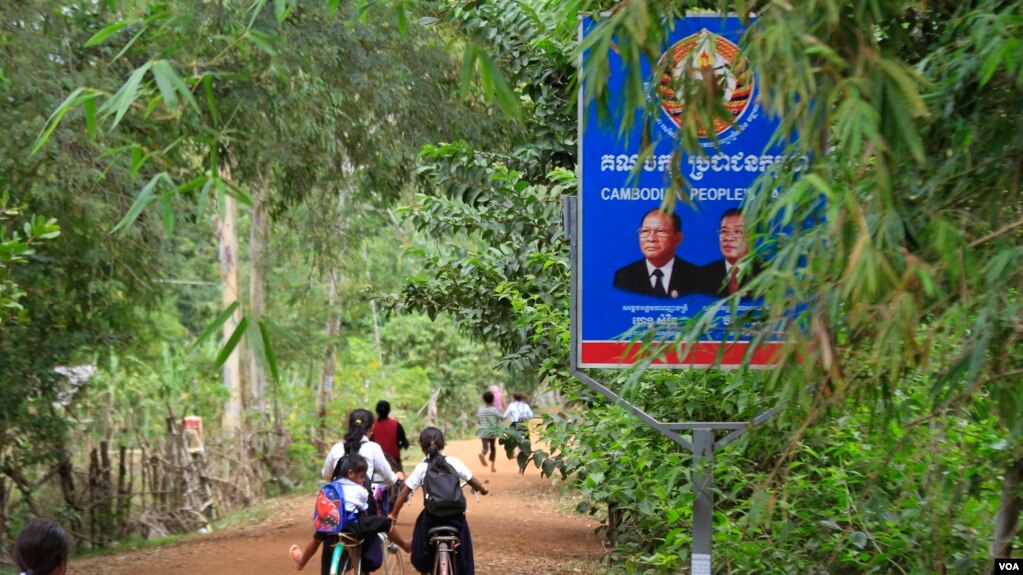Editorial by Manekseka Sangkum
Repressive regimes know only too well just how to exploit the lack of cohesion and solidarity among the masses. They understand that the populace as an entity are a loosely bonded tapestry of groups and individuals with their personal as well as social concerns and world-views. The challenge for these regimes is to steer or pattern all these eclectic preoccupations of the masses within manageable boundaries, ensuring that the balance between their fear of sanctions resulting from breaching those boundaries and, the sphere of their immediate personal needs, clans, families and social affiliations is maintained. To ensure that the desired "stability" resting upon such a framework of social balance is achieved, the state employs a range of socio-political measures aimed at aligning people's loyalty and dependence onto its own political existence by means of social-economic patronage, in the main, but just as crucially, through mass propaganda, disinformation [fake news!], as well as eliminating non-conforming opinion leaders, disaffected individuals, civil groups and emasculating genuine opposition forces.
These regimes also know that despite or because of such an approach to maintaining control over the masses, there will come a point where whatever they do won't be sufficient to stem the restless and growing desire within ordinary people for 'change'. Hence, the selective clamp-down upon individuals and groups for seemingly minor acts of non-conformity and social 'deviance' or protest. In the eye of the regime in question, such swift and severe reprisal mirrors not so much the severity of those isolated offenses, but rather, the daring and temerity shown through the example set forth for all others to, perhaps, emulate and potentially instigate a mass movement that cannot be controlled.
We have in fact witnessed this preemptive pattern in repression throughout the life of the CPP regime, and before that, in the Socialist Republic of Vietnam which has always permitted a degree of personal and social freedom but at the same time this freedom has also been invariably and forcibly subordinated to political control and supremacy of the ruling state, whilst, its erstwhile comrade-in-arms and sister in Pol Pot's Democratic Kampuchea, chose a more totalitarian model and ended up with a shorter life span as a consequence.
From expressing personal views on social media to Veng Streng industrial protest and the recent road-bloc in Kratie province staged by desperate and justly aggrieved land dispute victims, the regime seems to have no better, more humane solutions to dealing with such 'mundane' issues that are in fact rooted in its very own legacy of internal greed, corruption, incompetence and moral decay.
The question that begs to be asked is: what if an entire commune throws its shoes at any of these billboard posters? What if an entire district, nay, an entire province takes the same action? What if, indeed, an entire country follows suit?!
Now that would be really revolutionary...
<<<>>>
23 មិនា 2018
ហ៊ុល រស្មី
voa

រូបឯកសារ៖ ក្មេងៗសិស្សសាលាជិះកង់កាត់ស្លាកសញ្ញានៃមេដឹកនាំគណបក្សប្រជាជនកម្ពុជា ដែលមានរូបលោកនាយករដ្ឋមន្រ្តី ហ៊ុន សែន ជាប្រធានគណបក្ស និង លោក ហេង សំរិន ប្រធានរដ្ឋសភា នៅតាមផ្លូវក្នុងភូមិបន្ទាយមាស ឃុំតាជេស ស្រុកកំពង់ត្រឡាច ខេត្តកំពង់ឆ្នាំង។ រូបថតថ្ងៃពុធ ទី៨
ខែវិច្ឆិកា ឆ្នាំ២០១៧។ (ស៊ុន ណារិន/VOA)
តុលាការខេត្តកំពង់ស្ពឺបានសម្រេចតម្កល់សាលក្រមការកាត់ទោសស្ត្រី ដែលយកស្បែកជើងគប់ស្លាកសញ្ញាគណបក្សដែលមានរូបលោកហ៊ុន សែន និងលោកហេង សំរិន ឲ្យជាប់ពន្ធនាគារ២ឆ្នាំ ដែលមន្ត្រីសិទ្ធិមនុស្សមិនហ៊ានបកស្រាយថា តើយុត្តិធម៌ឬអយុត្តិធម៌នោះទេ ព្រោះវាជាប់ពាក់ព័ន្ធនឹងអ្នកមានអំណាចកំពូលៗ។
ភ្នំពេញ —
សាលាដំបូងខេត្តកំពង់ស្ពឺបានសម្រេចតម្កល់ការកាត់ទោសកំបាំងមុខស្ត្រីដែលយកស្បែកជើងគប់ស្លាកគណបក្សប្រជាជនកម្ពុជា ឲ្យជាប់ពន្ធនាគាររយៈពេល២ឆ្នាំ និងពិន័យជាប្រាក់៥លានរៀល។ នេះបើយោងតាមសេចក្តីប្រកាសរបស់អង្គការការពារសិទ្ធិមនុស្សលីកាដូដែលបានចេញផ្សាយនៅថ្ងៃព្រហស្បតិ៍នេះ។
អ្នកស្រី សំ សុខា ត្រូវបានចោទប្រកាន់ពីបទ«បទប្រមាថ» និង «បទញុះញង់ឲ្យមានការរើសអើង» ក្នុងខែមេសា ឆ្នាំ ២០១៧ គឹភ្លាមៗបន្ទាប់ពីអ្នកស្រីបានបង្ហោះវីដេអូនៅលើបណ្តាញសង្គមហ្វេសប៊ុក បង្ហាញពីសកម្មភាពរបស់អ្នកស្រីកំពុងគប់ស្បែកជើងទៅស្លាកគណបក្សប្រជាជនកម្ពុជាដែលមានរូបថតលោក ហ៊ុន សែន នាយករដ្ឋមន្ត្រីកម្ពុជា និងលោក ហេង សំរិន ប្រធានរដ្ឋសភាជាតិ។ ក្រោយការប្រកាសចាប់ខ្លួន អ្នកស្រី សំ សុខា បានភៀសខ្លួនទៅកាន់ប្រទេសថៃ។
វីដេអូ ដែលបានបង្ហោះជាសាធារណៈកាលពីខែមេសា ឆ្នាំ ២០១៧ មុនពេលបោះឆ្នោតជ្រើសរើសក្រុមប្រឹក្សាឃុំ-សង្កាត់នោះ មានរួមបញ្ចូលនូវពាក្យពេចន៍ និងមតិរិះគន់ខ្លាំងៗរបស់អ្នកស្រីចំពោះលោកនាយករដ្ឋមន្ត្រី។ នេះបើយោងតាមសេចក្តីប្រកាសរបស់អង្គការការពារសិទ្ធិមនុស្សលីកាដូ ដែល VOA ទទួលបាន។
លោក អំ សំអាត ប្រធានការិយាល័យបច្ចេកទេសស៊ើបអង្កេតរបស់អង្គការឃ្លាំមើលសិទ្ធិមនុស្សលីកាដូ បានប្រាប់ VOA នៅថ្ងៃព្រហស្បតិ៍នេះថា តុលាការខេត្តកំពង់ស្ពឺ មិនមានការបន្ធូរបន្ថយក្នុងការកាត់ក្តីរបស់ខ្លួនទេ ដោយបានរក្សាទុកដដែលនូវការផ្តន្ទាទោសដោយកំបាំងមុខប្រឆាំងនឹងអ្នកស្រីសំ សុខា។ លោកបានបដិសេធមិនធ្វើសេចក្តីអធិប្បាយថា តើការកាត់ក្តីនេះមានយុត្តិធម៌ឬយ៉ាងណាទេ។ តែលោកមានប្រសាសន៍ថា រាល់ក្តីក្តាំរវាងអ្នកមានអំណាចជាមួយនឹងអ្នកទន់ខ្សោយ គឺអ្នកទន់ខ្សោយរមែងទទួលទោសធ្ងន់ធ្ងរ។
«ខ្ញុំតែងតែសង្កេតឃើញ អីចេះទេ កន្លងមកថា បើសិនជាទាក់ទងនឹងថ្នាក់ដឹកនាំអី បើសិនជា ថា្នក់ដឹកនាំ ឬក៏អ្នកដែលមានអំណាចអី ហើយគូភាគីម្ខាងទៀត ការកាត់សេចក្តីទៅច្រើនតែដាក់ អតិប្បបរមាតែម្តង»។
នៅមុនការប្រកាសតម្តល់ការកាត់ទោស អ្នកស្រីសំ សុខានៅថ្ងៃព្រហស្បតិ៍នេះ អង្គការឃ្លាំមើលសិទ្ធិមនុស្ស (Human Rights Watch) បានប្រតិកម្មនឹងអាជ្ញាធរថៃដែលបានចាប់បញ្ជូនស្រ្តីរូបនេះ ពីប្រទេសថៃមកកម្ពុជាវិញ កាលពីខែកុម្ភៈ ទោះបីជាអ្នកស្រីទទួលបានសិទ្ធិជ្រកកោនហើយក៏ដោយ។ នៅក្នុងខែកុម្ភៈដដែលនេះ អង្គការសិទ្ធិមនុស្សមួយនេះបានអំពាវនាវឲ្យអាជ្ញាធរកម្ពុជាដោះលែងស្ត្រីឈ្មោះ សំ សុខានេះ ជាបន្ទាន់ ហើយថា ការចាប់ជនដែលទទួលបានសិទ្ធិជ្រកកោន គេចចេញពីការធ្វើទុក្ខបុកម្នេញណាមួយ ហើយបញ្ជូនដោយបង្ខំបែបនេះគឺជា«ការធ្វើទារុណកម្ម និងរំលោភសិទ្ធិមនុស្សយ៉ាងធ្ងន់ធ្ងរ»។
អ្នកស្រីសំ សុខា ត្រូវបានចាប់ខ្លួននៅប្រទេសកម្ពុជា ទៅតាមដីកាបង្គាប់ឲ្យចាប់ខ្លួន ឃុំខ្លួនចេញដោយលោកចៅក្រម អ៊ុក រ៉េតគន្ធា នៃសាលាដំបូងខេត្តកំពង់ស្ពឺ។
នៅមុនការចាប់ខ្លួននេះ អ្នកស្រី សំ សុខា ដែលកើតឆ្នាំ១៩៧៩ ត្រូវបានតុលាការសម្រេចផ្តន្ទាទោសដោយកំបាំងមុខ ដាក់ពន្ធនាគារកំណត់រយៈពេល២ឆ្នាំ គិតចាប់ពីថ្ងៃចាប់ខ្លួនបាន និងពិន័យជាប្រាក់៥លានរៀល ពីបទញុះញង់ឲ្យមានការរើសអើង និងជេរប្រមាថ» ប្រព្រឹត្តនៅឃុំរាម ស្រុក ព្រៃនប់ ខេត្តព្រះសីហនុ កាលពីថ្ងៃទី១ ខែមេសា ឆ្នាំ២០១៧។
ក្រៅពីអង្គការសិទ្ធិមនុស្សអន្តរជាតិ ក៏មានអង្គការសិទ្ធិមនុស្សជាតិជាច្រើនទៀតបានរិះគន់ថា ចំណាត់ការនៃការបញ្ជូនស្រ្តីឈ្មោះសំ សុខាពីប្រទេសថៃមកកាត់ទោសនៅកម្ពុជាគឺជាការរំលោភសិទ្ធិមនុស្សយ៉ាងធ្ងន់ធ្ងរ ហើយថា ការចាប់ខ្លួនជនភៀសខ្លួនដែលបានអនុវត្តសិទ្ធិនយោបាយនេះនឹងកា្លយជាសម្ពាធមួយទៀតទៅដល់អ្នកដែលហ៊ានរិះគន់ក្រុមមេដឹកនាំនៅកម្ពុជា។
ចំណែកឯការិយាល័យឧត្ដមស្នងការអង្គការសហប្រជាជាតិទទួលបន្ទុកសិទ្ធិមនុស្សនៅកម្ពុជា បង្ហាញការខកចិត្តចំពោះការចាប់បញ្ជូនស្ត្រីខ្មែរម្នាក់នេះ ពីប្រទេសថៃត្រឡប់មកកម្ពុជាវិញ បន្ទាប់ពីអង្គការសិទ្ធិមនុស្សដ៏ធំមួយនេះចាត់ទុកស្រ្តីរូបនោះថា «ជាជនភៀសខ្លួន» រួចទៅហើយនោះ។
តាមសេចក្តីប្រកាសរបស់អង្គការពារសិទ្ធិមនុស្សលីកាដូ អ្នកស្រី សំ សុខា ធ្លាប់ត្រូវបានជំនុំជម្រះកាលពីថ្ងៃទី ១៥ ខែមីនា ឆ្នាំ២០១៨៕

No comments:
Post a Comment